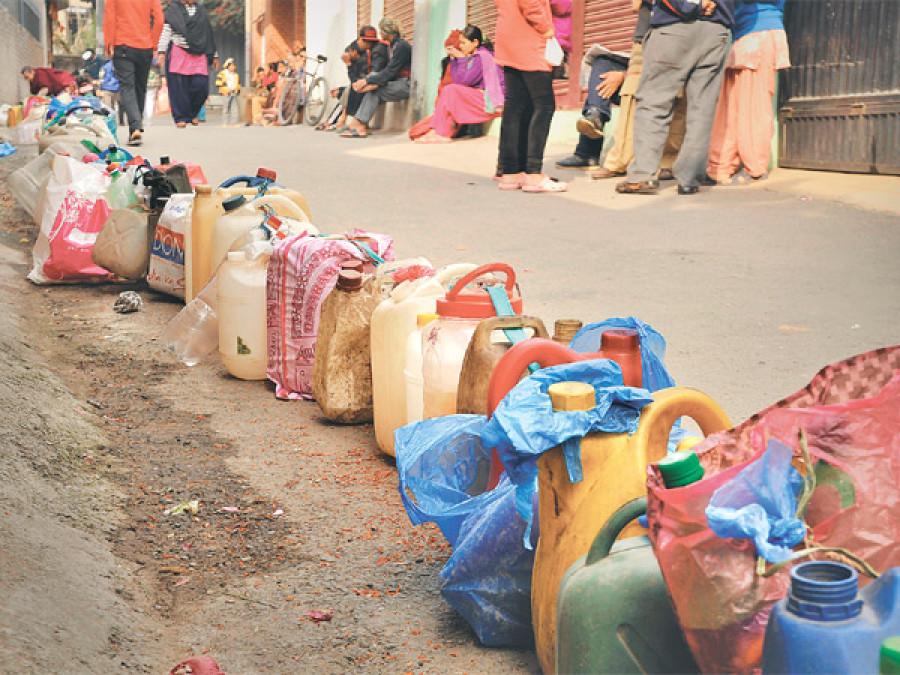Money
Shortages, price hike hit Kathmandu dwellers
Shyam Choudhary from Bardia, who used to deliver LPG house-to-house in Kathmandu, is now jobless and has been struggling to feed his family and pay the rent for his room in Setopool.
Suman Bashyal
Shyam Choudhary from Bardia, who used to deliver LPG house-to-house in Kathmandu, is now jobless and has been struggling to feed his family and pay the rent for his room in Setopool.
He would get paid per cylinder, but the LPG shortage created by the Tarai agitation and Indian blockade has meant that his wages have dropped drastically in the past two months.
To add to his woes, market prices have shot up due to rampant black marketing, and his household expenditure has swelled beyond his income. “As prices of all essential goods have gone up, my spending on food has also risen to Rs15,000 per month from the usual Rs10,000. I have been feeding my wife and two children by borrowing money, but I cannot ask for loans again and again.”
Despite working as a LPG deliveryman, he has been having a hard time getting cooking gas for himself. “Sometimes, I cook our meals by burning firewood, and sometimes by using an electric heater; but these options are very expensive,” added Choudhary.
Likewise, Sumitra Budhathoki from Dolakha, who has been living in Kathmandu for the education of her two children, said, “Schools have stopped their bus service and the canteens are closed. As fast foods like noodles and biscuits are not available, I have to worry everyday how to prepare tiffin for the children because of the gas shortage.”
Since there is no gas, she has to wait for the power to come on to cook food, and arranging time for cooking has been difficult for her. She said that her electricity bill had soared as she has been using the electric heater. “My monthly household expenses have increased by Rs5,000 to Rs25,000 since the blockade,” she said.
Similarly, Surendra Basnet, who runs an auto workshop in Battisputali, said, “There are not many vehicles coming to my workshop for repairs which has hit my income, but daily expenditure has gone up sharply.” He complained that traders had been setting prices for their goods arbitrarily, but the government had not been active in controlling black marketing.
The trade embargo by India and the agitation in the Tarai have made life hard as fuel and food have become short. As the country depends on imports for food and raw materials, many local factories have been closed for more than two months.
Transporters have hiked the fares saying that they have to buy gasoline on the black market. Locally produced food items have also become expensive due to the shortage and high freight charges.
Many hotels and restaurants have shut down while some have shortened their menus and jacked up prices due to lack of LP gas and kerosene. With transportation and shipments in disarray, prices of daily commodities have risen sharply. Jeera Masino rice, which used to cost Rs1,500 for a 25-kg sack, now costs Rs1,800. Manufacturers have hiked prices of edible oil and sugar sharply.
Sunflow brand sunflower oil costs Rs295 per litre against Rs135 two months ago. Similarly, sugar prices have soared to Rs80 per kg from Rs65 before.
Packaged food items like noodles and biscuits along with other daily essentials have also become dearer. “There is a shortage, and retailers have been forced to pay more for their stock which is why market prices have gone up,” said Pabitra Man Bajracharya, president of the Retailers Association of Nepal. He added that manufacturers and wholesalers were responsible for the price hike.
Meanwhile, consumer rights activists have complained that black marketing will be institutionalised in the country if the government does not take immediate action against those involved in overpricing and hoarding.
“Black marketers continue to rule the market as government officials themselves are involved,” said Prem Lal Maharjan, president of the National Consumer Rights Forum.




 20.12°C Kathmandu
20.12°C Kathmandu














